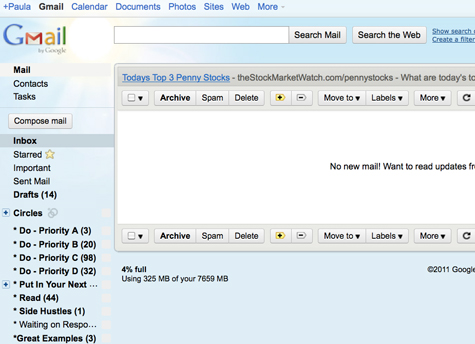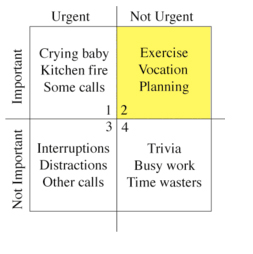 I spent the weekend slaying the distractions in my life.
I spent the weekend slaying the distractions in my life.
I flung the junk out of my file cabinet. I brainstormed goals for the New Year, ranked them, and eliminated most.
Most of us are pulled in too many directions: too many goals to chase, skills to learn, career avenues to attempt.
There are too many movies on in my Netflix queue, too many books in my Kindle, too many messages in my Inbox.
It’s normal to dive headfirst into a hundred exciting projects. But when we try to do everything, we end up doing nothing.
Time is like money: we must ruthlessly cut things that don’t matter, so we can spend lavishly things that matter most.
Here are my Top 3 hints for achieving this:
#1: Limit Your Priorities.
What’s the number one law of keeping your closet or garage organized?
Each time you add a new sweater to your closet (or new tool to your garage), donate another one. That way your total number of items remains the same.
This is popular advice, but most people only apply it to managing their stuff. Most people fail to apply it to managing their time.
Try this:
Limit the number of projects on your list. For each new task on your to-do list, you MUST delete another task – either because you’ve achieved it or because it’s no longer worthy of your time.
How?
Step One: I define the four major “sectors” of my life as:
- My family/ social life
- My health/ spirituality
- My career/ business
- My investments/ real estate
Your sectors might be different – for example, an avid musician might want a sector devoted to “My Musical Life.”
Step Two: I create a spreadsheet for each “sector”. In the first column, I brainstorm everything I need to do for each sector.
Health? Swimming, yoga, take multivitamins, stop eating processed foods.
Real Estate? Search foreclosure listings, appeal the property tax assessment.
Once I’m done brainstorming, I’ll review the list, ranking each task based on its importance.
Then I ignore everything but the Top 10 items in each sector.
#2: Keep Your Inbox at Zero
 Here’s a screenshot of my Inbox (click “display images” if you’re reading this by email.)
Here’s a screenshot of my Inbox (click “display images” if you’re reading this by email.)
Notice that my Inbox is empty. Also notice the labels in the left-hand column:
Do – Priority A –
This is where “urgent” tasks are held. Limit: 3-5
Do – Priority B –
This is where “important and moderately urgent” tasks are held. Limit: 15-20
Do – Priority C –
This is where “important but not urgent” tasks end up. This folder almost 100 tasks inside, which is far too many. I ought to cull this down to 50.
Do – Priority D –
This is just a placeholder for “stuff I’ll never do.” I might as well toss this straight into the trash. “D” is for “dump.”

It’s tough to let go of a project. I like keeping ideas around. Knowing it’s “still on the table” makes me feel better.
So I “trick my mind” by placing it in Priority D – a list I’ll never get around to doing. Once it’s there, I never think about it again.
These ideas came from two sources:
- David Allen’s book Getting Things Done taught me the principle of Inbox Zero. (Read my full review here.)
- Stephen Covey’s book 7 Habits of Highly Effective People taught me to distinguish “urgent” from “important.”
#3: Stop Penny-Pinching Distractions
Remember: the goal is to ruthlessly cut the things that don’t matter. This includes penny-pinching distractions.
Examples?
- Filling out online surveys in exchange for gift cards. You’ll never get rich this way.
- Spending more than 5 minutes a week scanning coupons.
- Selling things on eBay that will net profit $2-3 per item (unless you’re building a scalable business that has a goal of selling one item per minute or more.)
What do surveys, coupons and selling junk on eBay have in common? They’re “think small” operations. They distract you from your top priorities, which – ironically — prevents you from earning big rewards down the road.
These things don’t hog an obscene amount of your time. But 10 minutes here, 10 minutes there – it adds up.
Be frugal with your time.
Thanks to Alan Cleaver for the photo!
